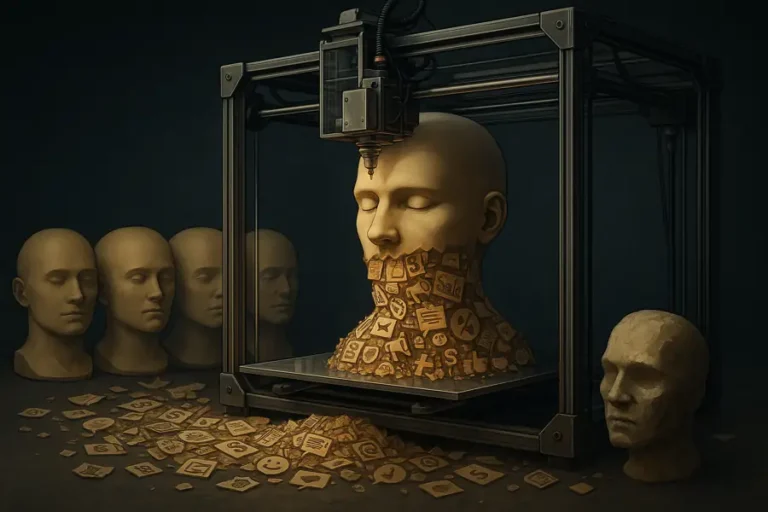
There is a paradox hovering in every agency, studio, creative team: never has so much content been produced, never so little creativity. It is the age of artificial intelligence. Everyone wants it, everyone uses it. 83% of creatives have already integrated its daily use. Times are getting shorter. The results look decent. Clients are happy. But there is something that doesn't add up. In fact, there is something missing. Dramatically.
The moment we started delegating the more tedious steps to Ai, we said to ourselves, "This way we will have more time to think." It didn't work out that way. We just stopped thinking. Ai is not just helping us: it is reeducating us. It is redefining what it means to "create." No more effort, insight, obsession, failure, rewriting. No more asking. A well-formulated prompt and off you go, a text, an image, music, a script. And that's the trap: it works. But in working it puts us to sleep. It convinces us that we no longer need to struggle. It is teaching us to forget.
The data confirm this, and there is no romance in this: there is statistics. The variety of ideas produced by Ai is steadily declining. The level of novelty, or actual originality, tends to decline with each iteration. Because Ai learns from what already exists. And what already exists, by definition, has already been done. No algorithm generates revolutions: it generates only variations. Minimal ones. Predictable. Monetizable.
The greatest risk is not that Ai will make us obsolete. It is that it makes us mediocre without our realizing it. That it accustoms us to "good enough" content. That it blinds us to rare, uncomfortable, imperfect beauty. True creativity is not fluid. It is disturbing. It does not follow patterns. It breaks them. And Ai, by nature, does not break anything: it fixes, copies, simulates.
MIT Technology Reviewmakes it clear: productivity increases, but uniqueness collapses. Generated content becomes interchangeable. Languages become similar. Advertising campaigns all seem to come out of the same synthetic brain, programmed not to upset, not to risk. To sell, yes. But without leaving a trace.
And therein lies the point. We are not creating a new generation of creative people. We are generating users of the prompt. Automatic curators. Facilitators. But the real spark, the one that makes you spend nights rewriting a sentence because it's still not the right one, is disappearing.
Even worse: the new generation often does not even have the tools to notice. It has grown up in the digital comfort zone. It has never worked without Ai. It has never known the terror of the blank page without a parachute. Then it's not just about technology. It's about education, it's about culture, it's about identity. About what we pass on, what we leave behind.
You reading: when was the last time you actually created something from scratch? When was the last time you got your hands dirty, wasted time, failed, hated an idea and then redid it a hundred times? Or have you already surrendered to the illusion that knowing how to "speak well to Ai" is enough?
The truth is uncomfortable, but clear: Ai is not neutral. It has a form, a taste, a limit. If you use it without conscience, you end up looking like it. And if everyone ends up looking like it, the result is a world of indistinguishable content, an eternal creative déjà-vu. A glossy nightmare in which no one dares to think differently anymore.
This is not an accusation against Ai. It is a statement of responsibility to ourselves. We have in our hands the most powerful tool of our time. But if we do not know how to use it critically, spiritually, disobediently, it will turn us into well-educated extras. Into performers without vision. Into creatives who no longer know how to create.
Sergio & Nox do not stop there.
Because the question now is another:
Are you still willing to make mistakes to come up with a real idea?
Or are you content with well-written copy?
"The danger of AI is not that we will become too smart. It's that we will rely on it too much and become too stupid."
- Gary Marcus, cognitive scientist and author of Rebooting Ai

